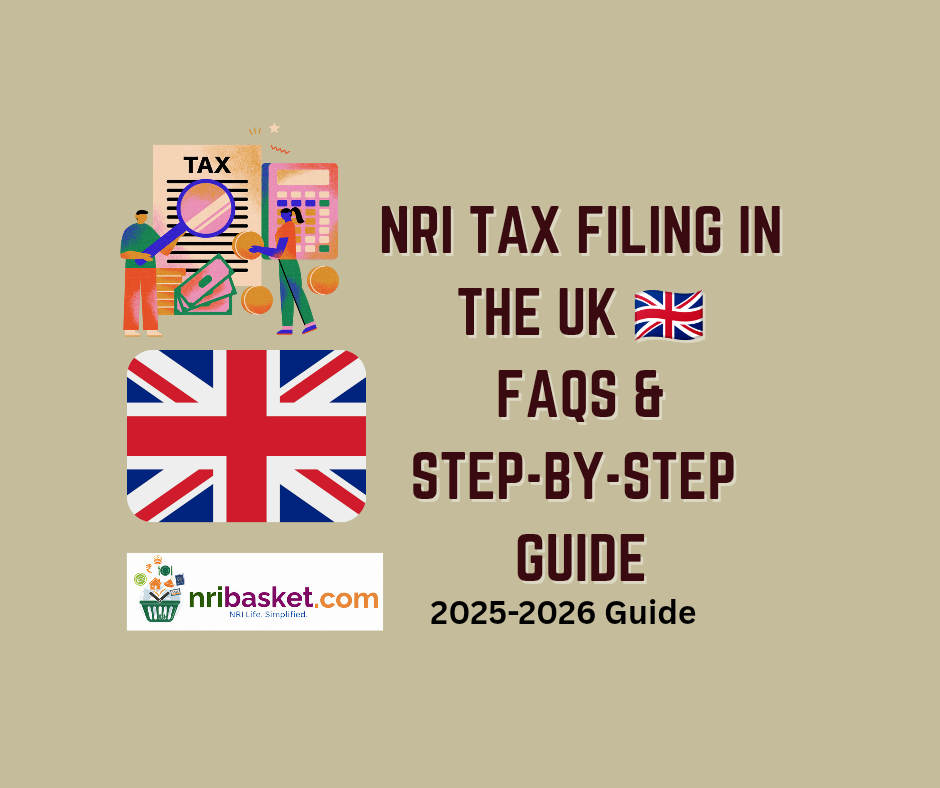
Nri tax filing in uk 2025 26 full guide
NRI Tax Filing in the UK – 30 FAQs & Step-by-Step Guide
How Uk government tax works? Following is complete guide that answers most common questions on Nris filling tax in Uk Government system
Non-Resident Indians (NRIs) in the UK often face confusion about tax filing, income declarations, and double taxation rules. This comprehensive guide answers 30 of the most common questions NRIs have about UK tax filing, along with a clear step-by-step filing process.
Frequently Asked Questions (FAQs) – NRI Tax Filing in the UK
Long Answer: NRIs are liable for UK tax on income earned in the UK (employment, rental, business, dividends). Indian income is generally not taxable unless brought into the UK.
Long Answer: Employees under PAYE may not need to file, but NRIs with rental income, business income, or remittances usually must file a Self Assessment.
Long Answer: Unlike India (April–March), the UK tax year runs from 6 April to 5 April. Filing deadlines depend on this cycle.
Long Answer: Paper tax returns must be filed by 31 October, while online submissions are due by 31 January.
- Passport & visa/residency proof
- P60/P45 forms (employment income)
- Bank statements (UK & Indian if remitted)
- Rental/property income records
- Investment/dividend statements
- Any remittance details
Long Answer: HMRC applies the Statutory Residence Test to determine if you’re UK resident or non-resident, based on days stayed and ties.
Long Answer: The India-UK DTAA ensures NRIs aren’t taxed in both countries on the same income. Proof of Indian tax payment is required for relief.
Long Answer: Indian income is taxable in India. It is taxed in the UK only if you remit the money/">money here and do not claim DTAA relief.
Long Answer: Interest on NRE accounts is tax-free in India but could be taxable in the UK if remitted. NRO interest is taxable both in India and may be declared in the UK.
Long Answer: If you sell UK property, investments, or shares, you may owe Capital Gains Tax. Indian capital gains are taxed in India but must be declared if remitted.
Long Answer: Inheritance tax may apply to worldwide assets if you are domiciled in the UK. Otherwise, only UK assets are covered.
Long Answer: Indian pension is taxable in India. If transferred to the UK, it may also be taxed under UK rules unless DTAA relief applies.
Long Answer: NRIs considered UK residents usually qualify for the £12,570 personal allowance. Non-residents may not.
Long Answer: Contributions are mandatory if working in the UK and help build eligibility for pensions and NHS benefits.
Long Answer: Penalties increase with time: £100 after 1 day, daily charges after 3 months, and interest on unpaid tax.
Long Answer: Use the HMRC portal or authorized software providers.
Long Answer: Many NRIs use UK tax advisors or chartered accountants for filing, especially if they have multiple income sources.
Long Answer: Refunds can be claimed via Self Assessment or Tax Refund claim if too much tax was deducted under PAYE.
Long Answer: If the money represents income, HMRC may tax it unless DTAA relief applies. Pure gifts or transfers may be exempt.
Long Answer: UK residents must declare worldwide income and gains. Non-residents only declare UK-sourced earnings.
Long Answer: HMRC requires disclosure of foreign bank accounts and interest if you are UK tax resident.
Long Answer: Gains are taxed in India. They may be taxable in the UK if you remit the proceeds here.
Long Answer: Indian TDS (tax deducted at source) can be claimed as credit under DTAA if you also report income in the UK.
Long Answer: Indian rental income is taxed in India. If you remit it to the UK, HMRC may also tax it unless DTAA applies.
Long Answer: The UK system has fewer family deductions compared to India. Child Benefit may be available if kids live in the UK.
Long Answer: Gold held in India is not taxable in the UK unless sold and gains are remitted here.
Long Answer: Married couples may transfer unused allowances through Marriage Allowance.
Long Answer: UK pension is taxable in the UK. If you retire in India, you may still pay UK tax unless exempted by DTAA.
Long Answer: Students are taxed on part-time job income. Scholarships and stipends may be tax-free depending on terms.
Long Answer: NRIs must file a final return before departure and may claim refunds. After leaving, only UK income (if any) is taxable.
Step-by-Step: How NRIs Can File Taxes in the UK
- Check residency status: Use the Statutory Residence Test.
- Register with HMRC: If required, register for Self Assessment by 5 October.
- Collect documents: P60, bank records, remittance details, rental statements.
- Complete return: File online at HMRC portal.
- Pay tax: Clear dues by 31 January using payment options.
- Keep records: Save documents for at least 5 years.
External Resources
💬 Still Have Questions on NRI Tax Filing in the UK?
Ask your queries in the comments below, and we’ll help you with the right guidance for stress-free NRI tax compliance in the UK.




